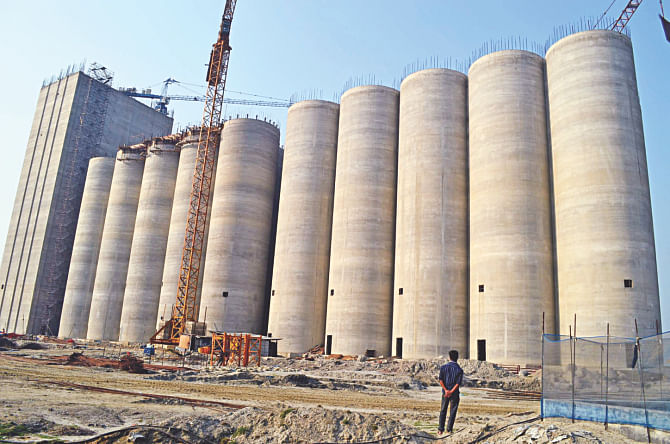Mongla silo nearly done
Mongla silo nearly done

The construction of the food grain silo at Mongla is nearing completion, creating hopes of job opportunities and higher economic activities among locals of the decaying seaport town and its adjacent rural areas.
Already 65 percent of the construction work for the 50,000-tonne grain silo, the largest in the southwest region, has been completed, with the rest expected to be done by June next year, said Bimal Bhuiyan, the deputy project director.
The silo, which will be mainly used for handling imported wheat, is being built on the banks of Pashur River in Joymony village from across the Sundarbans.
Estimated to cost Tk 614 crore, the silo will facilitate the government to address food shortage in the southwest and the north in the event of natural disasters like cyclone, said officials at the Directorate General of Food.
The silo will be helpful in distributing cereals in the region, said Bhuiyan, adding that river routes will be used for the most part to transport cereals from the silo to districts in the region.
The Mongla silo will be the country's fifth and it would take the total storage capacity to 2.75 lakh tonnes from the present 2.25 lakh tonnes. Another silo, with 1.5 lakh tonnes capacity, might be built just beside it with financing from the World Bank, Bhuiyan said.
The food storage will have modern handling equipment and will reduce operational losses and arrest pilferages.
“We will be able to unload grains faster. Besides, the activities at the silo will create job prospects for couple of hundreds of people.”
Pratap Bain, a resident at a nearby locality that largely depend on brackish water shrimp farming, also thinks the construction of the silo will bring changes to the lives of many in the area for the better.
ENVIRONMENTAL CONCERNS
However, there are environmental concerns too. The construction of the silo has created a rush of industrialists and businesspersons, who have bought lands in the neighbourhood to set up industries, including the hazardous ones, on the banks of Pashur.
The area adjacent to the silo holds the Sundarbans and it is feared that the uptick in economic activities will affect it. The mangrove forests act as a natural wall, reducing the intensity of cyclones and saving lives and properties.
“It is true that the establishment of the silo and other industries will facilitate socio-economic development in the area. But sound pollution and lights at the silos and other industries is likely to affect the flora and fauna in the Sundarbans,” said Noor Alam, local coordinator of Bangladesh Poribesh Andolon.
Wheat carrying cargo ships will spill oil and the shipyards and other industries will generate harmful non-biodegradable wastes to the river water, affecting fish and aquatic animals.
He said the law does not permit construction of any structure within the zero kilometre perimetre of the Sundarbans. But the silo and other industries are being set up almost within that area, violating the rules, said Alam.
It will pose bigger threats to the already vulnerable mangrove forests, he added.
Bhuiyan, however, said the silo will not put any negative effect on Sundarbans.